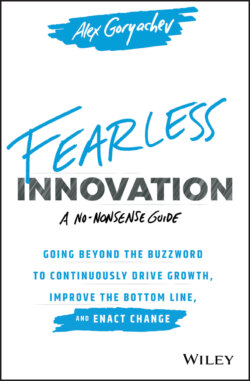Читать книгу Fearless Innovation - Alex Goryachev - Страница 13
Don’t Join the Dying Breeds
ОглавлениеYou’re probably thinking that, as a rule, “don’t join the dying breeds” is pretty much self-evident. Who would want to be a casualty of the Fourth Industrial Revolution, and wouldn’t most leaders do all they could to avoid such a fate? It’s a good point, but the truth is it doesn’t always play out that way in reality, no matter our best intentions. Let me give you a simple example: We all know that exercise is key to living longer—no one would deny that. Yet the US weight-loss industry is currently valued at $72 billion and growing.5 If we actually followed the advice of our doctors and exercised diligently, we wouldn’t be spending so much on meal replacement programs, pills, and the latest, greatest diets. The US is one of the most educated nations on earth,6 but this hasn’t protected it from an obesity epidemic.7 Despite knowledge about the benefits of exercise, and an overall desire to live longer, nearly 40 percent of Americans are obese.8 Even though we know better, we can’t seem to help ourselves; many companies that have receded into oblivion are no different. Maybe they made the effort, maybe they didn’t, but one thing is for sure—they have gone extinct, some along with their entire industries, even when they, too, “knew better.”
The ever-growing list of recent former industry pioneers that have quickly disappeared in this new era is well-known and well-trodden: AOL, BlackBerry, Kodak, Myspace, Motorola, Nokia, Polaroid, Sears, Toys “R” Us, Xerox, Blockbuster—it continues on and on. You can still visit the last remaining Blockbuster in the world, in Bend, Oregon, which has become a popular tourist attraction, but that’s it for what was once the world’s largest video rental chain.9 This fate could have been avoided had the company’s focus been on innovation, allowing leaders to see what was happening right in front of them and what was to come. In 2008, Jim Keyes, the CEO of Blockbuster at the time, told the Motley Fool, “Neither RedBox nor Netflix are even on the radar screen in terms of competition.”10 Of course, Keyes is not alone.
Many years ago, a recruiter asked me to consider interviewing for a small Palo Alto startup called Facebook. I laughed it off. The concept of social media already existed, and Myspace—a popular social media network at the time that once surpassed Google as the most visited website in the United States—seemed to be doing incredibly well and meeting all its customers’ needs. Friggin’ Myspace! When the platform ended up losing most, if not all, of the music that its users uploaded in the twelve years between 2003 and 2015 (which amounted to 53 million songs from 14.2 million artists), it was almost like nothing happened.11 That was because by 2015, Myspace had fallen so far into obscurity, no one seemed to notice the loss of so much un-backed-up data—this was the company that I thought would make startups like Facebook completely hopeless.
Shortsightedness stifles our ability to stay relevant and contributes to a mindset that lulls us into believing that as long as everything is generally fine now, it’ll be fine in the near, or distant, future as well. When it comes to the business environment, today almost always gets in front of tomorrow. Part of human nature is that as we grow older, we may be wiser (though maybe not always), but we also become self-centered and pay less attention to the changes happening around us. The same idea applies to most leaders: even when change is on the horizon, they resist it or brush it off, as if they will find shelter in this “proven” strategy that has failed so many companies before. We often don’t take the time to ask “Is change coming?” let alone to answer this question. Instead, when a major shift takes place, we tend to respond in one of three ways.
